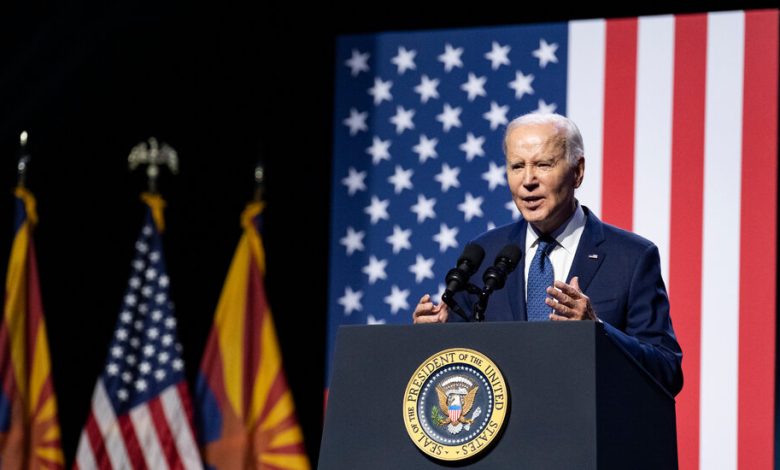In Arizona, Bad Feelings About the Economy Sour Some Voters on Biden

If President Biden hopes to replicate his narrow victory in Arizona, he will need disillusioned voters like Alex Jumah. An immigrant from Iraq, Mr. Jumah leans conservative, but he said he voted for Mr. Biden because he could not stomach former President Trump’s anti-Muslim views.
That was 2020. Since then, Mr. Jumah, 41, said, his economic fortunes cratered after he contracted Covid, missed two months of work as a trucking dispatcher, was evicted from his home and was forced to move in with his mother. He said he could no longer afford an apartment in Tucson, where rents have risen sharply since the pandemic. He is now planning to vote for Mr. Trump.
“At first I was really happy with Biden,” he said. “We got rid of Trump, rid of the racism. And then I regretted it. We need a strong president to keep this country first.”
His anger helps explain why Mr. Biden appears to be struggling in Arizona and other closely divided 2024 battleground states, according to a recent poll by The New York Times and Siena College.
Surveys and interviews with Arizona voters find that they are sour on the economy, despite solid job growth in the state. The Biden administration also fails to get credit for a parade of new companies coming to Arizona that will produce lithium-ion batteries, electric vehicles and computer chips — investments that the White House hails as emblems of its push for a next generation of American manufacturing.
Breanne Laird, 32, a doctoral student at Arizona State University and a Republican, said she sat out the 2020 elections in part because she never thought Arizona would turn blue. But after two years without any pay increases and after losing $170,000 trying to fix and flip a house she bought in suburban Phoenix, she said she was determined to vote next year, for Mr. Trump.
She bought the investment property near the peak of the market last year, and said she watched its value slip as mortgage rates rose toward 8 percent. She said she had to max out credit cards, and her credit score fell.
Arizona’s housing market fell farther than most parts of the country after the 2008 financial crisis, and it took longer to recover. Few economists are predicting a similar crash now, but even so, Ms. Laird said she felt frustrated, and was itching to return Mr. Trump to power.
“I’m even further behind,” she said. “I see the value in voting, and plan to vote as much as possible.”
A majority of Arizona voters in the recent New York Times/Siena survey rated the country’s economy as poor. Just 3 percent of voters said it was excellent.
Arizona experienced some of the worst inflation in the country, largely because housing costs shot upward as people thronged to the state during the pandemic. Average monthly rents in Phoenix rose to $1,919 in September from $1,373 in early 2020, a 40 percent increase according to Zillow. Average rents across the country rose about 30 percent over the same period.
Home prices and rents have fallen from their peaks this year, but even so, economists say that the state is increasingly unaffordable for middle-class families, whose migration to Arizona has powered decades of growth in the state.
Arizona’s economy sprinted out of the pandemic, but economists said the speed of new hiring and consumer spending in the state has now eased. The state unemployment rate of 4 percent is about equal to the national average, and the quarterly Arizona Economic Outlook, published by the University of Arizona, predicts that the state will keep growing next year, though at a slower pace.
Arizona has added 280,000 jobs since Mr. Biden took office, according to the federal Labor Department, compared with 150,000 during Mr. Trump’s term. Phoenix just hosted the Super Bowl, usually a high-profile boost to the local mood and economy.
Barely a week goes by without Arizona’s first-term Democratic governor, Katie Hobbs, visiting a groundbreaking or job-training event to talk up the state’s economy or the infrastructure money arriving from Washington.
Mr. Biden was even farther behind Mr. Trump in another poll being released this week by the Phoenix-based firm Noble Predictive Insights. That survey of about 1,000 Arizona voters said Mr. Trump had an eight-point lead, a significant swing toward Republicans from this past winter, when Mr. Biden had a two-point edge.
Mike Noble, the polling firm’s chief executive, said that Mr. Trump had built his lead in Arizona by consolidating support from Republicans and — for the moment — winning back independents. Respondents cited immigration and inflation as their top concerns.
“Economists say, ‘Look at these indicators’ — People don’t care about that,” Mr. Noble said. “They care about their day-to-day lives.”
Bill Ruiz, the business representative of Local 1912 of the Southwest Mountain States Carpenters Union, said the Biden administration’s infrastructure bill and CHIPS Act were bringing billions of dollars into Arizona, and helping to power an increase in union jobs and wages. Carpenters in his union were working 7 percent more hours than they were a year ago, and the union’s membership has doubled to 3,400 over the past five years.
“We’re making bigger gains and bigger paychecks,” he said. “It blows me away people don’t see that.”
Political strategists say Mr. Biden could still win in Arizona next year, if Democrats can reassemble the just-big-enough coalition of moderate Republicans and suburban women, Latinos and younger voters who rejected Mr. Trump by 10,000 votes in 2020. It was the first time in more than two decades that a Democrat had carried Arizona and its 11 electoral votes.
The same pattern was seen in last year’s midterm elections, when Arizona voters elected Democrats running on abortion rights and democracy for governor, attorney general and secretary of state, defeating a slate of Trump-endorsed hard-right Republicans.
Abortion is still a powerful motivator and a winning issue for Democrats, but many Arizona voters now say their dominant concerns are immigration, inflation and what they feel is a faltering economy.
Grant Cooper, 53, who retired from a career in medical sales, is the kind of disaffected Republican voter that Democrats hope to peel away next year. He supports abortion rights and limited government, and while he voted for Mr. Trump in 2020, he said he would not do so again.
He said his personal finances and retirement investments were in decent shape, and he did not blame the president for the spike in gas prices in 2022. Still, he said he plans to vote for a third-party candidate next year, saying that both Mr. Biden and Mr. Trump were out-of-touch relics of a two-party system that was failing to address long-term challenges.
“They squibble and squabble about the dumbest things, rather than looking at things that could improve our economy,” he said. “The Republicans are fighting the Democrats. The Democrats are fighting the Republicans. And what gets done? Nothing.”
David Martinez, 43, is emblematic of the demographic shift that has made Arizona such a battleground. He and his family moved back to Phoenix after 15 years in the San Francisco Bay Area, where he still works remotely in the tech industry. He voted for Mr. Biden in 2020, and said he was worried about the threat Mr. Trump poses to free elections, democracy and America’s future in NATO.
His working-class friends and extended family don’t share the same concerns. These days, the political conversations with them usually begin and end with the price of gas (now falling) and eggs (still high).
“It falls on deaf ears,” Mr. Martinez said of his arguments about democracy. “They feel down about Biden and inflation and his age. They’re open to giving Trump a second term or skipping the election entirely.”
Camille Baker contributed reporting.




